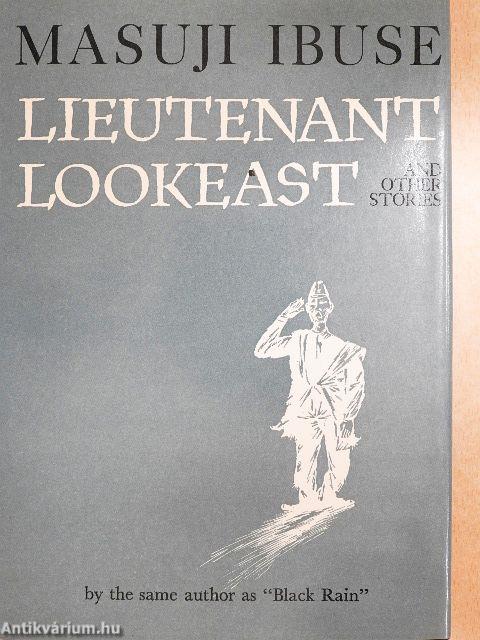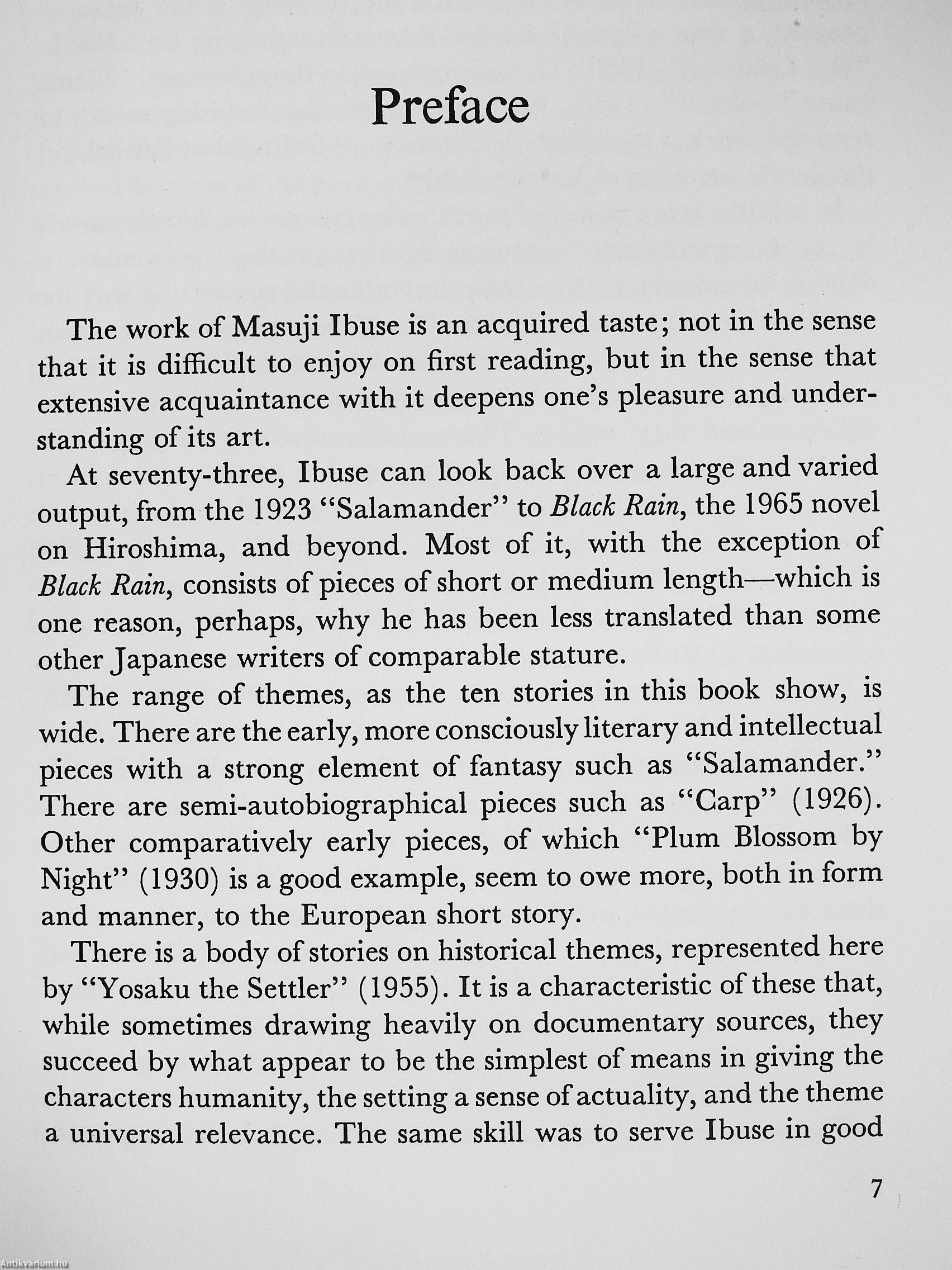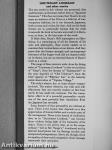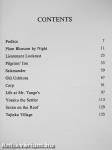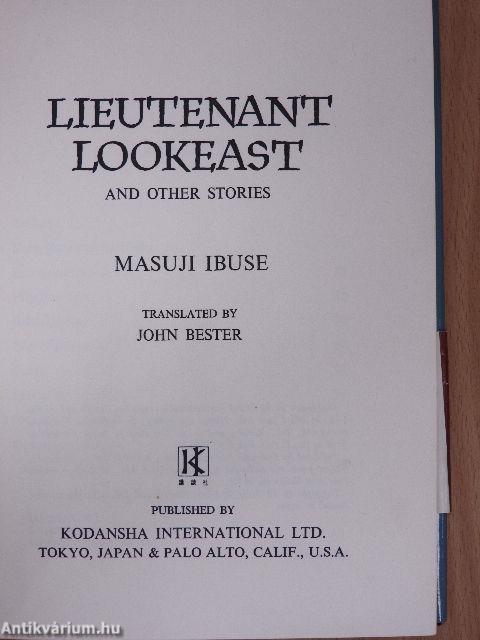1.067.317
kiadvánnyal nyújtjuk Magyarország legnagyobb antikvár könyv-kínálatát

VISSZA
A TETEJÉRE
JAVASLATOKÉszre-
vételek
Lieutenant Lookeast
and other stories
| Kiadó: | Kodansha International Ltd. |
|---|---|
| Kiadás helye: | Tokió-Palo Alto |
| Kiadás éve: | |
| Kötés típusa: | Vászon |
| Oldalszám: | 247 oldal |
| Sorozatcím: | |
| Kötetszám: | |
| Nyelv: | Angol |
| Méret: | 22 cm x 15 cm |
| ISBN: | |
naponta értesítjük a beérkező friss
kiadványokról
naponta értesítjük a beérkező friss
kiadványokról
Előszó
TovábbFülszöveg
I. !11 : I
t'J
I- i ,
" 11
¦ ¦ ; I'M " ¦ i ¦
: i i, ' .tl . ; ¦ . 1 ¦ I
I .'d
i.' , i. i 1 i ''I ! ; '[' V f/r; , , i
'' '¦) ' IV . li . V '- I .'iV''
¦ I 'i
LIEUTENANT LOOKEAST and other stories
The ten stories in this volume are presented, first and foremost, as literature rather than as "Japanese literature." This does not mean that Ibuse is in any sense an imitator of the West or a follower of contemporary fashions; he is too intensely Japanese, both as man and writer, for that. And yet his basic themes are so profoundly human that his work transcends the local to become universal; it is literature, in short, in the best sense of the word.
li Black Rain, Ibuse's 1965 masterpiece on Hiroshima, is a summing-up of all the features of his style and philosophy, these stories enable us to examine their various facets at our leisure. And they prove that the literary strength and contemporary relevance of the longer work did not depend solely on its theme, but are an... Tovább
Fülszöveg
I. !11 : I
t'J
I- i ,
" 11
¦ ¦ ; I'M " ¦ i ¦
: i i, ' .tl . ; ¦ . 1 ¦ I
I .'d
i.' , i. i 1 i ''I ! ; '[' V f/r; , , i
'' '¦) ' IV . li . V '- I .'iV''
¦ I 'i
LIEUTENANT LOOKEAST and other stories
The ten stories in this volume are presented, first and foremost, as literature rather than as "Japanese literature." This does not mean that Ibuse is in any sense an imitator of the West or a follower of contemporary fashions; he is too intensely Japanese, both as man and writer, for that. And yet his basic themes are so profoundly human that his work transcends the local to become universal; it is literature, in short, in the best sense of the word.
li Black Rain, Ibuse's 1965 masterpiece on Hiroshima, is a summing-up of all the features of his style and philosophy, these stories enable us to examine their various facets at our leisure. And they prove that the literary strength and contemporary relevance of the longer work did not depend solely on its theme, but are an essential feature of Ibuse's work as a whole.
The range of these stories is wide: from the biting satire of "Lieutenant Lookeast" to the wry lyricism of "Carp";; from the fantasy of "Salamander" to the near slapstick of "Old Ushitora'"; from the brief vignette of "Pilgrims' Inn" to the leisurely social observation of "Tajinko Village."
The style is elusive, dry, at times almost tongue-in-cheek. The author observes, but with such self-effacement that one scarcely realizes at first how surely he has made his comment. Yet the cumulative effect is of a powerful personality—surely one of the most powerful that translation from the Japanese has revealed. ¦
Some features of that personality are obvious at once. There is the humor that depends on a fine appreciation of human foibles and a subtle sense of the incongruous. There is the hatred of conformity that, as in "Lieutenant Lookeast," can become bitter without losing sight of the humanity of its object. There is the poetry that, as in the extraordinary "Life at Mr. Tange's," is achieved not by labored descriptions but by fleeting touches and unexpected juxtapositions. Above all, though, there is a quality of clear-eyed compassion whose message transcends time and place.
Jacket Design by M. Kuwata Vissza
Témakörök
- Idegennyelv > Idegennyelvű könyvek > Angol > Szépirodalom > Regény, novella, elbeszélés
- Szépirodalom > Regény, novella, elbeszélés > Az író származása szerint > Ázsia > Japán
- Szépirodalom > Regény, novella, elbeszélés > Tartalom szerint > Lélektani regények
- Szépirodalom > Regény, novella, elbeszélés > Tartalom szerint > Történelmi regények > Legújabb kor > Egyéb
- Szépirodalom > Regény, novella, elbeszélés > Tartalom szerint > Földrajzi besorolások > Ázsia
- Szépirodalom > Regény, novella, elbeszélés > Tartalom szerint > Kor- és társadalomrajz



